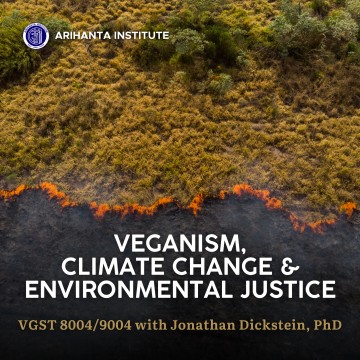Veganism, Climate Change, and Environmental Justice
Course Intro Video


Veganism, Climate Change, and Environmental Justice
 Spring 2026 (January 26 – May 4, 2026)
Spring 2026 (January 26 – May 4, 2026)Thursday 8:00 - 10:50 a.m. PT
Course Course VGST 8004/9004 is a graduate seminar in the MA in Engaged Jain Studies program offered by Claremont School of Theology (CST).
This interdisciplinary course explores the intersections between veganism, climate change, and environmental justice. It considers veganism not merely as a dietary or lifestyle choice, but as a political and ecological practice. Through philosophical, scientific, and activist perspectives, students will interrogate the environmental impacts of animal agriculture, the racialized and classed dimensions of climate vulnerability, and the transformative potential of food systems rooted in justice and care.
Learning Objectives
- Gain a basic understanding of the origin, history, and applications of veganism both regionally and globally.
- Understand the main features of the global climate crisis and their relationship to industrial food systems.
- Connect climate crisis to differential climate vulnerability, or how environmental consequences impact populations differently due to race and class-based discrimination.
- Understand the basis tenets of environmental justice, with respect to animal-based industries in particular.
- Deploy tools for constructive dialogue across cultures and religions regarding veganism, climate change, and environmental justice.
Course Details
To enroll in this course, please email: study@arihantainstitute.org.Instructor
 Jonathan Dickstein, PhD
Jonathan Dickstein, PhD
Jonathan Dickstein, PhD, the Tirthankara Shreyansanath Endowed Assistant Professor of Jain and Vegan Studies at Arihanta Institute, specializes in South Asian Religions, Religion and Ecology, and Comparative Religious Ethics. He received his doctoral degree in Religious Studies from the University of California, Santa Barbara, where he wrote his dissertation on ancient Indian animal taxonomies and their relevance for religious ritual and dietary practice. Jonathan’s current work focuses on Jainism and contemporary ecological issues, and accordingly extends into Critical Animal Studies, Food Studies, and Diaspora Studies.
Jonathan has published in a wide array of interdisciplinary journals on topics such as veganism and politics, yoga and diet, Jain veganism, and the ethic of nonviolence (ahiṃsa). Jonathan considers himself a scholar-practitioner, having spent many years not only in libraries but also in public advocating for justice for both humans and nonhumans alike.
Jonathan has published in a wide array of interdisciplinary journals on topics such as veganism and politics, yoga and diet, Jain veganism, and the ethic of nonviolence (ahiṃsa). Jonathan considers himself a scholar-practitioner, having spent many years not only in libraries but also in public advocating for justice for both humans and nonhumans alike.
Enrollment Options
14-DAY FREE TRIAL
- Free, unlimited access to our self-paced courses for 14-days.
- Already used your free trial? Enroll in our Monthly or Annual Membership options at anytime and continue learning immediately!
MONTHLY MEMBERSHIP
- $45 USD / Month
-
Immediate access to course
#### | Name. - Unlimited access to our live and self-paced courses for one month, with month-to-month auto rollover.
- Excludes graduate seminars, language courses, and courses hosted on partner platforms.

